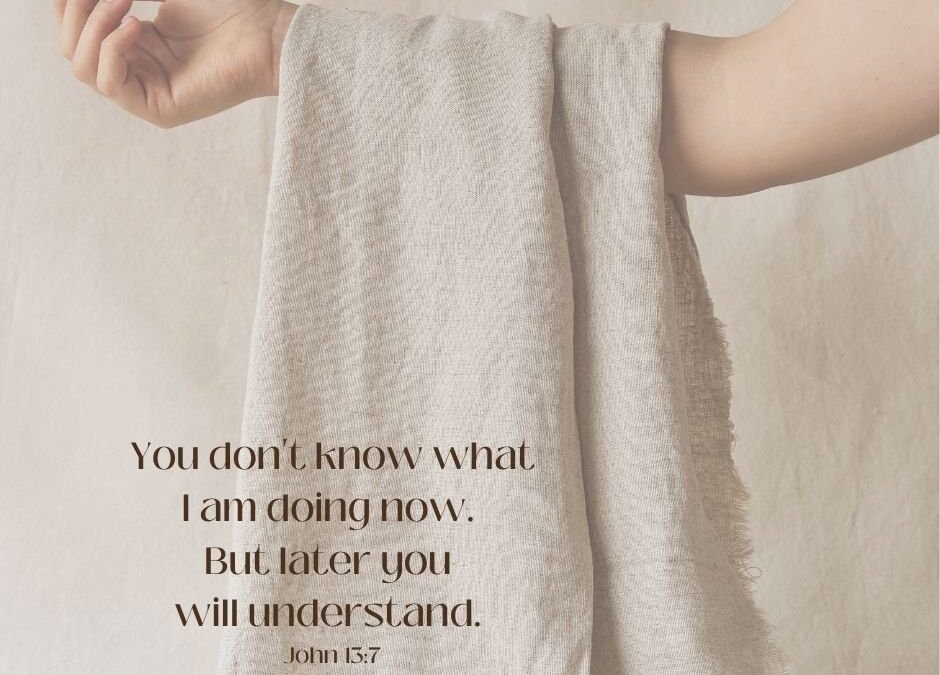Remembering What You Don’t Want to Forget
Sacrificial love appears in the place we least expect it this Maundy Thursday.
But first, I wish I had known it was our last conversation.
Christmas that year transported us to Craig’s parents’ home. In between mounds of wrapping paper and the glee of cousins who’d not seen each other in a while, I delayed our phone call for the return trip home.
Christmas Day came and went, followed by days of splashing in the pool, consuming gourmet meals, and bellowing in conversations around the table.
Logic and reason told me we’d have a better Christmas conversation with my grandmother once we arrived home.
But our conversation never happened.
I received the call as we boarded our flight home. My grandmother, who had raised me, had fallen and undergone hip surgery. The surgery was a success—coming out of anesthesia was not.
We ditched our AZ bags, furiously packed for new bags for MA, and hurried our van the thousand miles in hopes of her recovery. Along with desperation for that missed conversation.
Two weeks later, Meems took her unspoken words with her to Jesus.
How often do we blurt a quick check-in or listen on the surface, assuming we’ll have time to probe later when we’re not so tied up and busy?
How often do we wish we had been more attentive?
I imagine this frantic rummaging of memories accosted John’s mind as he watched Jesus bow his head and utter: “It is finished.”
What did He say?
What did He instruct us to remember?
In kindness, God preserved the message and teachings of His Son Jesus through the inspired writings of John’s Gospel.
Remembering Maundy Thursday
Maundy Thursday delivers us to the culmination of Jesus’ teachings as they gathered around the table, shuffling places to sit closest to their teacher.
Maundy Thursday and Sacrifical Love in the Mundane
We wash our feet every day.
Such an ordinary act.
Most don’t give it much thought.
I didn’t either–until my own feet were submersed in sacrificial love.
I was taken aback at how intimate and personal such a mundane practice could be.
It’s strange to describe removing the day’s stink and built-up grime from someone’s feet as a sacred moment. Yet that’s exactly what it was.
Author and scholar N.T. Wright puts it this way:
“Washing between someone’s toes is an intimate action. It is a moment of tenderness.” John for Everyone, Part Two, p. 43.
It’s this moment of tenderness and utter humility that defines why Jesus came at all.
You don’t understand now what I am doing, but someday you will. John 13: 7, NLT.
They didn’t understand. Awkwardness settled heavily as Peter asserted:
No, Peter protested, you will never ever wash my feet. John 13: 8, NLT.
In other words, this wasn’t how things were done. There were servants for such things. Surely, Jesus was above such a menial task.
But Jesus instructed otherwise.
Sacrificial love bends low and quietly speaks.
Sacrificial Love in Maundy Thursday’s Towel
Jesus’ time on earth was coming to an end. This upside down start to the Passover Meal was the silent conversation he didn’t want them to forget.
So, he got up from the table, took off his robe, wrapped a towel around his waist, and poured water into a basin. Then he began to wash the disciples’ feet, drying them with the towel he had around him. John 13:4-5, NLT.
Soon, each of them, save one, would separate their feet from him in betrayal, fear, lies, and utter abandonment. Their filth covered his hands as he moved steadily from one friend to another.
Unlike the valiant warrior they expected riding into Jerusalem, the donkey-riding servant bent low and quietly spoke. Undeterred by the disownment he knew would come, grace reached in and washed what they could not wash for themselves.
Jesus responded to their confusion:
You call me ‘Teacher’ and ‘Lord,’ and you are right because that’s what I am. And since I, your Lord and Teacher, have washed your feet, you ought to wash each other’s feet. I have given you an example to follow. Do as I have done to you. I tell you the truth, slaves are not greater than their master. Nor is the messenger more important than the one who sends the message. Now that you know these things, God will bless you for doing them. John 13:13-17, NLT.
Serve God. Serve one another.
Love God and love one another.
Maundy Thursday and Sacrificial Love in Our Grace-Lined Identity
Lent is a season of putting aside the temporary allegainces that identify us. It’s that wilderness journey that leads to less of us and more of God. Lent is the recognition that our need for God’s grace runs deep and is filled only through Him.
What might sacrificial love look like wrapped in Maundy Thursday’s towel?
- Do the menial tasks you secretly hope someone else will do because you don’t want to do them.
- Sit quietly and receive when everything in you wants to be the person giving instruction or taking care of someone else.
- Take the first step in loving someone who doesn’t deserve your love.
I love Peter’s response after Jesus corrects him. Can you hear the other disciples chuckling—there he goes again, impetuous Peter, as Peter bursted out:
Then wash my hands and head as well, Lord, not just my feet! John 13:9, NLT.
Peter didn’t understand it all, but he was all in. According to Jesus, our grace-lined identity comes one foot at a time. One sacrifical-love step at a time.
Will you join me in putting aside what you don’t understand?
Will you be washed and welcomed by Maundy Thursday’s Towel?
Will you risk living the grace life one foot at a time?
MAUNDY THURSDAY PRAYER:
Less of me, God.
More of you, God.
May it be so, God. Amen.
Until we meet again, may God’s absurdly generous grace enfold you in his towel as you unfold it for another.
Jennifer
P.S. You may find John’s account of Maundy Thursday here, in John 13: 1-20.

